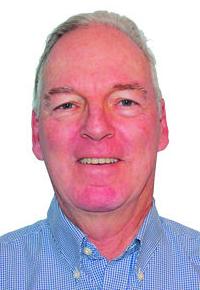 Mr. Fitzgerald worked for 6 newspapers as a writer and editor as well as a correspondent for several news services. He recently published his second novel, “Fracking Justice,” and lives in Valois and Watkins Glen with his wife. His “Write On” column appears Fridays. Contact him at Michael.Fitzgeraldfltcolumnist@gmail.com.
Mr. Fitzgerald worked for 6 newspapers as a writer and editor as well as a correspondent for several news services. He recently published his second novel, “Fracking Justice,” and lives in Valois and Watkins Glen with his wife. His “Write On” column appears Fridays. Contact him at Michael.Fitzgeraldfltcolumnist@gmail.com.
for the Finger Lakes Times
The entire issue of climate change might be a lot easier to deal with if it was the result of some extraterrestrial event. Think about movies like “Armageddon,” “Deep Impact” or the iconic “Independence Day.”
But it's not. It's here on Earth. See the Cli Fi Movie Awards news site here:
korgw101.blogspot.com.
In the first two, comets hurtled toward Earth on a collision course threatening planetary disaster. These movies showed a global population as it gathered forces for a heroic common solution. The disasters were averted only at the last moment largely through heroism, amazing on-screen pyrotechnics and worldwide cooperation.
In “Independence Day,” an alien invasion was thwarted by a combination of pluck, computer wizardry and military forces from a united Earth, battling a common enemy to save humanity.
Yes, that’s Hollywood and the work of scriptwriters’ imaginations.
But it’s time to gather our forces to deal with the real-life, real-time predicted catastrophe happening now.
This week and next in Paris, a save-the-planet script of sorts is being drafted by the COP21 leaders of 150 nations along with 40,000 delegates from 195 countries, all part of the United Nations Conference of Parties.
The goal is to hammer out a worldwide — and binding — agreement to slow the growth of climate change threatening life everywhere in manifold ways.
The conference — whatever its outcome — might not be as dramatic as dispatching Bruce Willis or Robert Duvall to pilot rockets with weapons to destroy comets.
But if the Paris confab is successful, its effect on future life on Earth certainly could turn out to be the stuff of legend.
It might even make a blockbuster movie.
The two-week conference began in the wake of marches Sunday attended by hundreds of thousands of people around the globe. They gathered to demand that the nations hammer out a solid agreement.
Many Finger Lakes area residents joined in that marching. In Watkins Glen, a rally of more than 350 people, including many Geneva residents, braved frigid temperatures to make their point.
A planned climate march in Paris was banned because of the recent terrorist attack in that city. But demonstrators placed 20,000 shoes in a main square to symbolize how many marchers would have gathered had France not been on a security lockdown.
Among the footgear were shoes sent by Roman Catholic Pope Francis and U.N. Secretary-General Ban Ki-moon, adding to the palpable sense of urgency for action and legitimacy of the cause.
This year is on track to be the warmest year ever on record on our planet. Ocean temperatures are at the highest since measurements first started being taken — in 1880.
Let those facts sink in for a moment.
The delegates aren’t in Paris to debate whether climate change is occurring — or even what role human industrialization has had in leading to this point. The conference is about what can be done about it on a global scale before it’s too late.
To many people in the Finger Lakes, a conference in Paris probably seems as distant as, well, a conference in Paris.
But in the last few years around Seneca Lake the concept of regionalism has begun to blossom, pushed up in good part because of stiff citizen opposition to the Crestwood Midstream proposal to store 88 million gallons of liquid propane gas in unlined salt caverns adjacent to Seneca Lake.
Beyond that, however, Finger Lakes residents are increasingly aware of serious regional water and air quality issues rearing their heads, threatening our environment and commerce.
Only a relatively few area governments — the Schuyler County Legislature and the Town of Reading for example — still cling desperately to their respective geographic pockets of provincialism.
Eventually, even those elected officials will come to realize they are part of a much larger world and have responsibilities to people outside their arbitrary political boundaries drawn in 1854.
Just like what’s happening on a global level. Let’s just hope it happens in time.
Fitzgerald worked for six newspapers as a writer and editor as well as a correspondent for several news services. He published his second novel, “Fracking Justice” in June and lives in Valois and Watkins Glen with his wife. His “Write On” column appears Fridays. He can be contacted at Michael.Fitzgeraldfltcolumnist@gmail.com .
But it's not. It's here on Earth. See the Cli Fi Movie Awards news site here:
korgw101.blogspot.com.
In “Independence Day,” an alien invasion was thwarted by a combination of pluck, computer wizardry and military forces from a united Earth, battling a common enemy to save humanity.
Yes, that’s Hollywood and the work of scriptwriters’ imaginations.
But it’s time to gather our forces to deal with the real-life, real-time predicted catastrophe happening now.
This week and next in Paris, a save-the-planet script of sorts is being drafted by the COP21 leaders of 150 nations along with 40,000 delegates from 195 countries, all part of the United Nations Conference of Parties.
The goal is to hammer out a worldwide — and binding — agreement to slow the growth of climate change threatening life everywhere in manifold ways.
The conference — whatever its outcome — might not be as dramatic as dispatching Bruce Willis or Robert Duvall to pilot rockets with weapons to destroy comets.
But if the Paris confab is successful, its effect on future life on Earth certainly could turn out to be the stuff of legend.
It might even make a blockbuster movie.
The two-week conference began in the wake of marches Sunday attended by hundreds of thousands of people around the globe. They gathered to demand that the nations hammer out a solid agreement.
Many Finger Lakes area residents joined in that marching. In Watkins Glen, a rally of more than 350 people, including many Geneva residents, braved frigid temperatures to make their point.
A planned climate march in Paris was banned because of the recent terrorist attack in that city. But demonstrators placed 20,000 shoes in a main square to symbolize how many marchers would have gathered had France not been on a security lockdown.
Among the footgear were shoes sent by Roman Catholic Pope Francis and U.N. Secretary-General Ban Ki-moon, adding to the palpable sense of urgency for action and legitimacy of the cause.
This year is on track to be the warmest year ever on record on our planet. Ocean temperatures are at the highest since measurements first started being taken — in 1880.
Let those facts sink in for a moment.
The delegates aren’t in Paris to debate whether climate change is occurring — or even what role human industrialization has had in leading to this point. The conference is about what can be done about it on a global scale before it’s too late.
To many people in the Finger Lakes, a conference in Paris probably seems as distant as, well, a conference in Paris.
But in the last few years around Seneca Lake the concept of regionalism has begun to blossom, pushed up in good part because of stiff citizen opposition to the Crestwood Midstream proposal to store 88 million gallons of liquid propane gas in unlined salt caverns adjacent to Seneca Lake.
Beyond that, however, Finger Lakes residents are increasingly aware of serious regional water and air quality issues rearing their heads, threatening our environment and commerce.
Only a relatively few area governments — the Schuyler County Legislature and the Town of Reading for example — still cling desperately to their respective geographic pockets of provincialism.
Eventually, even those elected officials will come to realize they are part of a much larger world and have responsibilities to people outside their arbitrary political boundaries drawn in 1854.
Just like what’s happening on a global level. Let’s just hope it happens in time.
Fitzgerald worked for six newspapers as a writer and editor as well as a correspondent for several news services. He published his second novel, “Fracking Justice” in June and lives in Valois and Watkins Glen with his wife. His “Write On” column appears Fridays. He can be contacted at Michael.Fitzgeraldfltcolumnist@gmail.com .
No comments:
Post a Comment